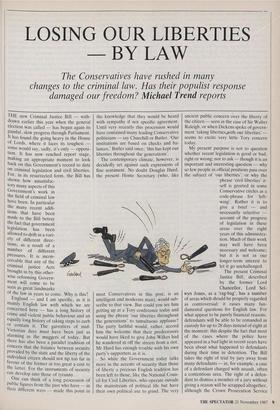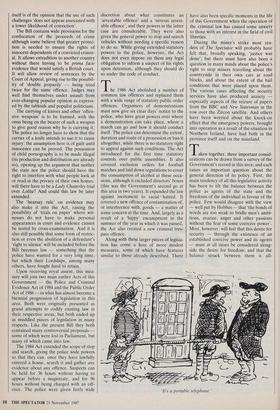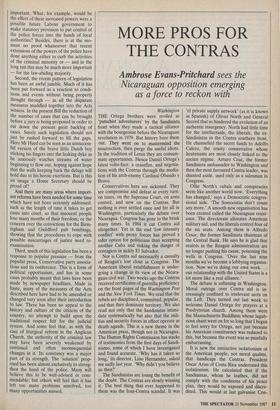LOSING OUR LIBERTIES BY LAW
The Conservatives have rushed in many changes to the criminal law. Has their populist response
England — and I am specific, as it is mainly English law with which we are concerned here — has a long history of crime and violent public behaviour and an equally long history of taking steps to curb or contain it. The garrotters of mid- Victorian days must have been just as alarming as the muggers of today. But there has also been a parallel tradition of concern that the balance between security provided by the state and the liberty of the individual citizen should not tip too far in favour of the former at too great a cost to the latter. For the instruments of security can develop into those of tyranny. One can think of a long procession of public figures from the past who have — in their different ways — made this point in the knowledge that they would be heard with sympathy if not specific agreement. Until very recently this procession would have contained many leading Conservative politicians — say Churchill or Butler. 'Our institutions are based on checks and ba- lances,' Butler said once; this has kept our liberties throughout the generations'. The contemporary climate, however, is decidedly set against such expressions of fine sentiment. No doubt Douglas Hurd, the present Home Secretary (who, like most Conservatives in this post, is an intelligent and moderate man), would sub- scribe to that view. But could you see him getting up at a Tory conference today and using the phrase 'our liberties throughout the generations' to tumultuous applause? The party faithful would, rather, accord him the welcome that their predecessors would have liked to give John Wilkes had he wandered in off the streets from a riot. Mr Hurd has enough trouble with his own party's supporters as it is. So while the Government today talks more in the accents of security than those of liberty a precious English tradition has been left to those, like the National Coun- cil for Civil Liberties, who operate outside the mainstream of political life but have their own political axe to grind. The very ancient public concern over the liberty of the citizen — seen in the case of Sir Walter Raleigh, or when Dickens spoke of govern- ment 'taking liberties.with our liberties' — seems to excite very little Tory concern today.
The present Criminal Justice Bill, described by the former Lord Chancellor, Lord Sel- wyn Jones, as a `rag-bag', has a number of areas which should be properly regarded as controversial: it raises many fun- damental questions for English law. For what appear to be purely financial reasons, defendants will be able to be remanded in custody for up to 28 days instead of eight at the moment: this despite the fact that most of the cases where the police have appeared in a bad light in recent years have been about what happened to defendants during their time in detention. The Bill takes the right of trial by jury away from many defendants — in, for example, a case of a defendant charged with assault, often a contentious area. The right of a defen- dant to dismiss a member of a jury without giving a reason will be scrapped altogether, although the Crown Prosecution Service itself is of the opinion that the use of such challenges 'does not appear associated with a lower likelihood of conviction'.
The Bill contains wide provisions for the confiscation of the proceeds of crime although some believe that greater protec- tion is needed to ensure the rights of innocent dependents of a convicted crimin- al. It allows extradition to another country without there having to be prima facie evidence that would satisfy a British court.
It will allow review of sentences by the Court of Appeal, giving rise to the possibil- ity of 'double jeopardy' — being tried twice for the same offence. Judges may well find themselves under assault from ever-changing popular opinion as express- ed by the tabloids and populist politicians.
The carrying of knives and other 'offen- sive weapons' is to be banned, with the onus being on the bearer of such a weapon to give good reason why he is carrying it. The police no longer have to show that the carrier of a knife intends to use it to cause injury: the assumption here is of guilt until innocence can be proved. The possession of child pornography is to be made illegal (its production and distribution are already so), opening up the argument that neither the state nor the police should have the right to interfere with what people look at or read in the privacy of their own homes: will there have to be a Lady Chatterley trial over Lolita? And could this law be later extended.
The 'hearsay rule' on evidence may also make it into the Act, raising the possibility of 'trials on paper' where wit- nesses do not have to make personal appearances in court and evidence cannot be tested by cross-examination. And it is also still possible that some form of restric- tion or even the abolition of a defendant's 'right to silence' will be included before the Bill becomes law — something that the police have wanted for a very long time, but which their Lordships, among many others, have fought hard to retain.
Upon receiving royal assent, this mea- sure will join two main earlier Acts of this Government — the Police and Criminal Evidence Act of 1984 and the Public Order Act of 1986— in what has almost become a biennial progression of legislation in this area. Both were originally presented as grand attempts to codify existing law in their respective areas; but both ended up as muddled pieces of legislation in many respects. Like the present Bill they both contained many controversial proposals — some of which were lost in Parliament, but many of which came into law.
The 1984 Act extended the scope of stop and search, giving the police wide powers so that they can, once they have lawfully entered a house, search it and gather any evidence about any offence. Suspects can be held for 36 hours without having to appear before a magistrate. and for 96 hours without being charged with an off- ence. The police were given fairly wide discretion about what constitutes an `arrestable offence' and a 'serious arrest- able offence', and their powers in the latter case are considerable. They were also given the general power to stop and search vehicles without needing a specific reason to do so. While giving extended statutory powers to the police, however, the Act does not even impose on them any legal obligation to inform a suspect of his rights upon detention, although they should do so under the code of conduct.
The 1986 Act abolished a number of common law offences and replaced them with a wide range of statutory public order offences. Organisers of demonstrations must now give six clear days' notice to the police, who have great powers over where a demonstration can take place, where a march can go and how it should conduct itself. The police can determine the extent, duration and route of a procession or ban it altogether, while there is no statutory right to appeal against such conditions. The Act introduced for the first time statutory controls over public assemblies. It also covered exclusion orders for football matches and laid down regulations to cover the consumption of alcohol at these occa- sions, although it excluded directors' boxes (this was the Government's second go at this area in two years). It expanded the law against incitement to racial • hatred. It covered a new offence of contamination of, or interference with, goods — a matter of some concern at the time. And, largely as a result of a 'hippy' encampment in the summer of the year in which it was passed, the Act also created a new criminal tres- pass offence.
Along with these larger pieces of legisla- tion has come a host of more modest measures, some of which have features similar to those already described. There have also been specific moments in the life of this Government when the operation of the criminal law has caused some anxiety to those with an interest in the field of civil liberties.
During the miner's strike most rea- ders of The Spectator will probably have felt that, broadly speaking, 'justice was done'; but there must have also been a question in many minds about the police's right to stop miners travelling about the countryside in their own cars at road blocks, and about the extent of the bail conditions that were placed upon them. The various cases affecting the security services have also produced anxiety — especially aspects of the seizure of papers from the BBC and New Statesman in the row over the Zircon satellite. And others have been worried about the knock-on effect that the emergency powers, brought into operation as a result of the situation in Northern Ireland, have had both in the province itself and on the mainland.
Taken together, three important consid- erations can be drawn from a survey of the Government's record in this area; and each raises an important question about the general direction of its policy. First, the main tendency of all this legislative activity has been to tilt the balance between the police as agents of the state and the freedoms of the individual in favour of the police. Few would disagree with the view
— well put by Hobbes — that 'the bonds of words are too weak to bridle men's ambi- tions, avarice, anger and other passions without the fear of some coercive power'. Most, however, will feel that this desire for security — through the existence of an established coercive power and its agents — must at all times be considered along- side the desire for freedom; and that the balance struck between them is all-
'It's a portable telephone.' important. What, for example, would be the effect of these increased powers were a possible future Labour government to make statutory provision to put control of the police forces into the hands of local authorities? Besides, there is at the mo- ment no proof whatsoever that recent extensions of the powers of the police have done anything either to curb the activities of the criminal minority or — and in the long run this may be much more important — for the law-abiding majority.
Second, the recent pattern of legislation has been an awful jumble. Much of it has been put forward as a reaction to condi- tions and events without being properly thought through — as all the disparate measures muddled together into the Acts witness. In the present Bill the reduction of the number of cases that can be brought before a jury is being proposed in order to cut down the present great backlog of cases. Surely such legislation should not just be rushed forward to fill the gaps. Here Mr Hurd can be seen as an unsuccess- ful version of the brave little Dutch boy sticking his fingers into the leaking dyke as he anxiously watches streams of water beginning to flow out, hoping against hope that the walls keeping back the deluge will hold due to his heroic exertions. But is this an image a Home Secretary should be proud of?
And there are many areas where import- ant reforms have been needed for some time which have not been seriously addressed: such as the length of time it takes to get cases into court, so that innocent people lose many months of their freedom; or the concern over the convictions for the Birm- ingham and Guildford pub bombings, showing that the procedures to cope with possible miscarriages of justice need re- examination.
Third, much of this legislation has been a response to popular pressure — from the populist press, Conservative party associa- tions and its conference. This is a form of political opportunism, and has in some cases probably meant that laws have been made by newspaper headlines. Made in haste, many of the measures of the Acts described here have had to be amended or changed very soon after their introduction to law. There has been no appeal to the history and culture of the citizens of the country, no attempt to build upon the traditional respect felt for the judicial system. And some feel that, as with the case of liturgical reform in the Anglican Church, the authority of the criminal law may have been severely weakened by continual and often inconsequential changes in it. Its constancy was a major part of its strength. The 'solution' prop- osed has been almost exclusively to streng- then the hand of the police. Many will believe this to be well-advised or com- mendable; but others will feel that it has left too many problems unsolved, too many opportunities missed.




































































 Previous page
Previous page